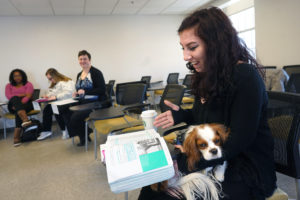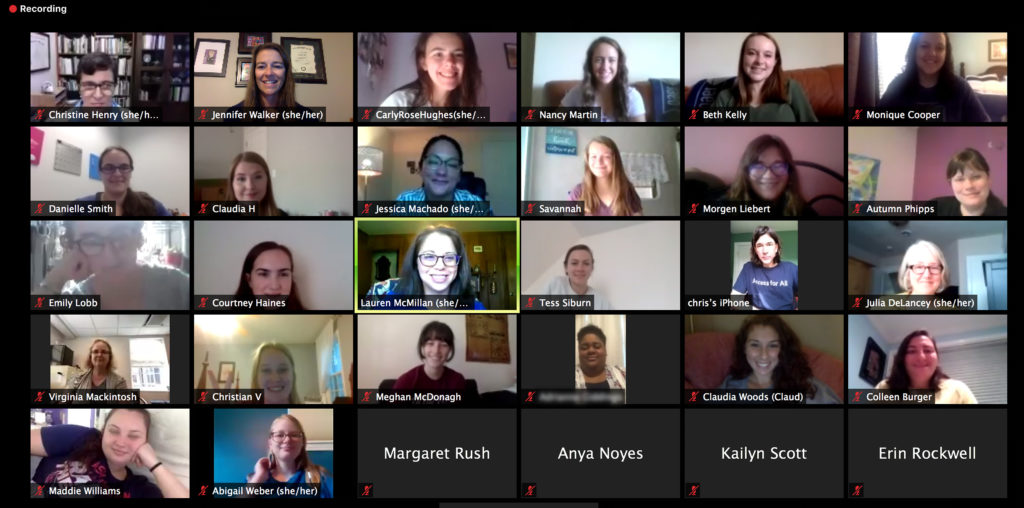One in four Americans lives with a disability, according to the Centers for Disease Control and Prevention. At the University of Mary Washington, it’s one in eight.

“With those sorts of numbers, it’s mind-boggling [that] disability doesn’t have more automatic inclusion when people think about diversity,” said UMW Professor of English Chris Foss.
As the Americans with Disabilities Act’s 30th year and October’s Disability Awareness Month shine a light on one of the country’s most underrepresented groups, so does a new UMW course. Offered for the first time this fall, Intro to Disability Studies (IDS) delves into the 21st-century experience of a diverse population, exploring cognitive, sensory, mobility and other differences as just as essential to the human condition as gender and race.
The 16-week course fans out across disciplines, examining disability throughout the lifespan in historical, political, social and other contexts. Years in the making, the class is team-taught by faculty and staff – from art history, education, English, historic preservation, psychology and the Office of Disability Resources (ODR) – who’ve poured their time and passion into the topic in hopes it gains traction.
“It took a lot of meetings, discussion and work on Google Docs to pull this together,” said Professor of Art History Julia DeLancey, who borrows from her first-year seminar, “The Beauty Difference Gives Us,” to deliver an IDS session on how disabilities affect artists’ work.
“Instructor of record” for the eight-person group, Foss, who teaches “Disability and Literature” and a first-year seminar on representations of autism in film and literature, began reaching out to faculty, deans, provosts and presidents more than a decade ago to design the IDS course.
“It’s taken a particular village,” he said of the group that managed to bring the vision to life.
College of Education Professor Jennifer Walker draws on her background in special education, while Professor of Psychological Science Virginia Mackintosh shares concepts of identity and social construction. The curriculum covers everything from discrimination and legal protections to accessible materials and assistive technology.
“In order to be fully empowered as disability rights activists, it’s important to have a strong foundation of knowledge to understand the history of anti-discrimination legislation and the work left to be done,” said ODR Director Jessica Machado, who teaches a session.
Twelve percent of UMW’s more than 4,000 undergraduates are registered with ODR, making it one of the most utilized offices of its type in Virginia, and making the IDS course a good fit for Mary Washington.
“It’s a class for everybody,” said senior Claudia Woods, who is deaf.“I think it would really challenge able people’s misconceptions about disabilities.”
A double-major in English and women’s and gender studies, with a minor in social justice, Woods is pairing her personal experience with course material to power her position as president of DiversAbility and steer the student group toward activism.

“The class and the potential minor embody the spirit of the liberal arts,” said Professor of Historic Preservation Christine Henry, who leads a session on architectural access. “A diversity of approaches to ideas and questions about people with disabilities contributes a whole greater than the sum of its parts.”
Henry’s departmental colleague Assistant Professor of Historic Preservation Lauren McMillan brings her expertise in how disability plays out in the profession of archaeology to the IDS course. ODR Assistive Technology Coordinator Danielle Smith and student assistant Savannah Rowland round out the group, whose members hope this fall offering will lead to a program in disability studies.
“There are many good things coming in the area of disability at UMW, and it’s due to a lot of dreaming, thinking, planning, organizing, activism, collaboration and partnership among many, many people,” Machado said. “We care deeply about disability. There is a lot of passion here.”
This new program is a wonderful and needed addition to a liberal arts education.. I graduated from MWC in 1980, and have become a member of the (invisible) disabiliity community in the years since then. Is there any possibility of taking just the Disability Concentration courses, as a certificate program perhaps, or auditing courses, online?
So glad to see this course developed. I was on a committee with Dr. Foss nearly a decade ago where we analyzed UMW’s buildings for accessibility and studied different ways of teaching to be inclusive.